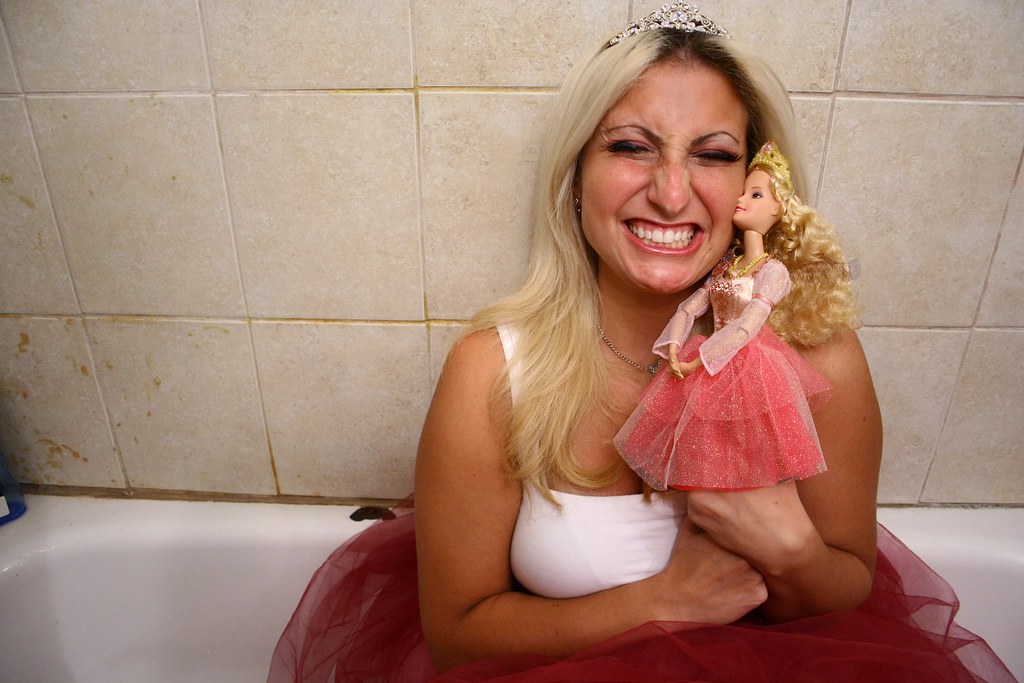 Barbie is the most iconic, popular and controversial doll of all time. Approximately 3 barbies are sold every second of the day, bringing in $3.6 billion in revenue every year. Just about every North American girl has owned one at some point in their lives. At 50 years old, Barbie is still maintaining her banging, and completely unrealistic dimensions, which have (thankfully) been widened from the original 36-18-38, 5'9 stature.
Barbie is the most iconic, popular and controversial doll of all time. Approximately 3 barbies are sold every second of the day, bringing in $3.6 billion in revenue every year. Just about every North American girl has owned one at some point in their lives. At 50 years old, Barbie is still maintaining her banging, and completely unrealistic dimensions, which have (thankfully) been widened from the original 36-18-38, 5'9 stature.
Barbie's body has been under criticism ever since her creation. She instills an image of false womanhood in the eyes of little girls, which has even inspired eating disorders and low-self esteem. According to Robert Dobson's article in The Sunday Times,
“These ultra-thin images not only lowered young girls’ body esteem but also decreased their satisfaction with their actual body size, making them desire a thinner body.”
Dr Margaret Ashwell, science consultant and former director of the British Nutrition Foundation, said: “These results are very important and show that children can be influenced at a very early age. We need to be aware of that and take the appropriate action.”
In 1965 the creation of "Slumber Party Barbie" hit the stores. She came with a book entitled "How to Lose Weight" that suggested, "Don't Eat." She even came with a cute scale that was stuck on 110lbs. Approximately 35lb lighter than any healthy woman would be at 5'9. Adorable! Right?Even though Barbie has the "perfect" body that any 14 year old, prepubescent teenage
 boy would swoon over, she's also been depicted in a variety of different ways other than her tall-blonde-decked-in-hot-pink self. She has had a wide array of powerful careers over the years. You can buy Doctor Barbie, Astronaut Barbie, Rockstar Barbie, PRESIDENT Barbie, and she has never been seen as a woman who has been pressured to marry or procreate. So why is Barbie an object of such feminist scorn? Shouldn't she also be regarded as an empowering play figure for young girls?
boy would swoon over, she's also been depicted in a variety of different ways other than her tall-blonde-decked-in-hot-pink self. She has had a wide array of powerful careers over the years. You can buy Doctor Barbie, Astronaut Barbie, Rockstar Barbie, PRESIDENT Barbie, and she has never been seen as a woman who has been pressured to marry or procreate. So why is Barbie an object of such feminist scorn? Shouldn't she also be regarded as an empowering play figure for young girls?Carol Oakman, an Art professor at Williams University did an Interview with The Economist about her extensive research on Barbie, and she believes Barbie is not seen as female empowering because, "ultimately, it's the fact that people think a woman can't look like that, and be so obsessed with her appearance without being a bimbo... Barbie's origins in that time makes it hard for her to ever escape the thinking that formed her, which was less empowering for women."
 As adults, it's easy for us to write off Barbie from a much more critical stand-point, but in the eyes of a young girl, Barbie encompasses a world of endless possibilities. Barbie can be used as a form of escapism and an outlet of creativity. Personally, I know when I was younger, I never looked at Barbie as a "hero" or "role model" hoping one day to grow torpedo breasts and dye my hair platinum blonde. Instead I used to chop off all her hair, draw little pictures to put around her house and constantly change her outfits. I admit, her unrealistic body is definitely problematic, but Mattel has been making the necessary changes. Barbie's body has since been redesigned to look more realistic, as well as more inclusive to different races of young girls.
As adults, it's easy for us to write off Barbie from a much more critical stand-point, but in the eyes of a young girl, Barbie encompasses a world of endless possibilities. Barbie can be used as a form of escapism and an outlet of creativity. Personally, I know when I was younger, I never looked at Barbie as a "hero" or "role model" hoping one day to grow torpedo breasts and dye my hair platinum blonde. Instead I used to chop off all her hair, draw little pictures to put around her house and constantly change her outfits. I admit, her unrealistic body is definitely problematic, but Mattel has been making the necessary changes. Barbie's body has since been redesigned to look more realistic, as well as more inclusive to different races of young girls.







Oh lawd. "Don't eat." That's just too much! But I like your point about barbie opening up an imaginative world for kids; sometimes we become so critical as adults, we forget what it means when you're a kid.
ReplyDeleteIn other news: I am in love your blog. I learn something new everytime I come to it.
Thanks Ashley! I love your blog as well. I'm always so excited when I see a new post up.
ReplyDeleteWe are definitely too critical as adults, but it's not a bad thing.
I know personally, I played with Barbie all the time, and I obviously didn't grow up seeing her as "the ideal woman." I actually only had one Barbie and whenever I'd get more Barbie stuff, I always wanted furniture for "her house." Except I didn't even have a house for her, I would just set up little rooms for her around the corners of my house haha. For me, I got to play around and be creative with designing what I wanted her living space to be like, but I also never had any pressure to "look a certain way" when I was younger. My crazy Italian family was constantly like "EAT EAT EAT."
So I think Barbie can't inspire eating disorders alone. It's different for every case, but there's gotta be some other kind of outside influence too, right? Just doesn't make sense to me.
I love that you posted on Barbie. Coming from a family of Barbie-enthusiasts (4 girls), we had absolutly every single thing Barbie could own. But I never grew up aspiring to be Barbie-despite my desire for a Barbie Jeep. Like you C, I would cut my barbie's hair, draw tatoos on her in permanent marker, and spend more time dressing her up than idealizing to look like her-or giving any thought to her proportions.
ReplyDeleteI agree with you and Ashley-I think it is helpful to think of Barbie as an object of imagination more than scruitny.
I was always really jealous of Barbie's vast amount and variety of clothing choices. I was so covetous of all her trendy outfits and wanted everything in my size. I also once fell on my pink Barbie car, which slashed open my leg, and I still have the scar to this day. That b!tch put me through hell.
ReplyDeletelol Dee that's so funny!
ReplyDeleteHahaha, I want to see the Barbie car scar!
ReplyDeleteOh I'll show you.
ReplyDeleteMalibu Stacy says:
ReplyDeleteLet's bake some cookies for the boys.
Barbie isn't real. She is plastic. I agree that yes some people do take it too far and try to be Barbie look a likes. I understand that you didn't grow up to want to look like Barbie and thats fine. You say you didn't look at her like a hero, but i did.. so does that make me a bimbo? I'm an only child plus when I was growing up we moved to a different state, I had to leave all my friends behind. That left me with the one friend I always had, Barbie. She was there when my parents were fighting and when I felt alone, she was always there.
ReplyDeleteYour page offended me, not all Barbie fans are the stupid bimbo type.
Never in this post did I say that girls who are obsessed with Barbie are bimbos and never once did I judge girls who looked up to Barbie like heroes. Re-read the post.
ReplyDeleteI quoted Carol Oakman who stated that SHE does not believe Barbie can be empowering because, "ultimately, it's the fact that people think a woman can't look like that, and be so obsessed with her appearance without being a bimbo..."
Those are her views expressed, not mine.
I then followed with a paragraph stating all the pros about Barbie.
Why would you be offended by a post that presented an objective view of a pop-culture item?